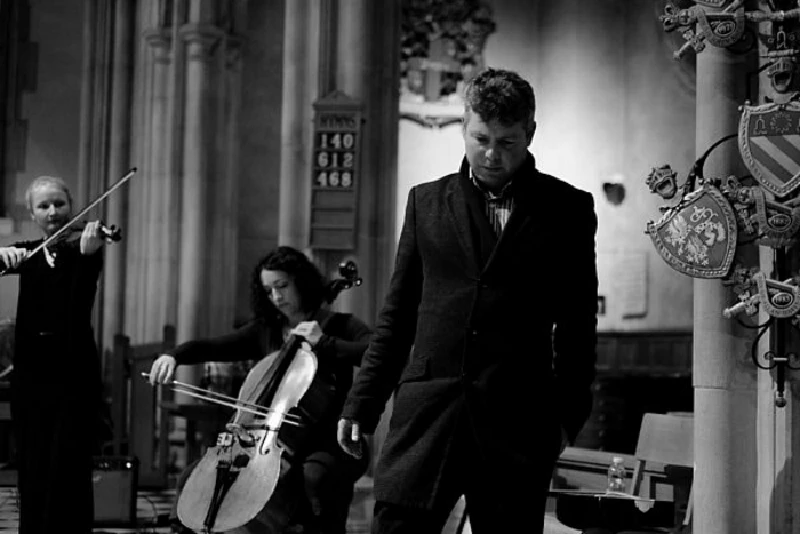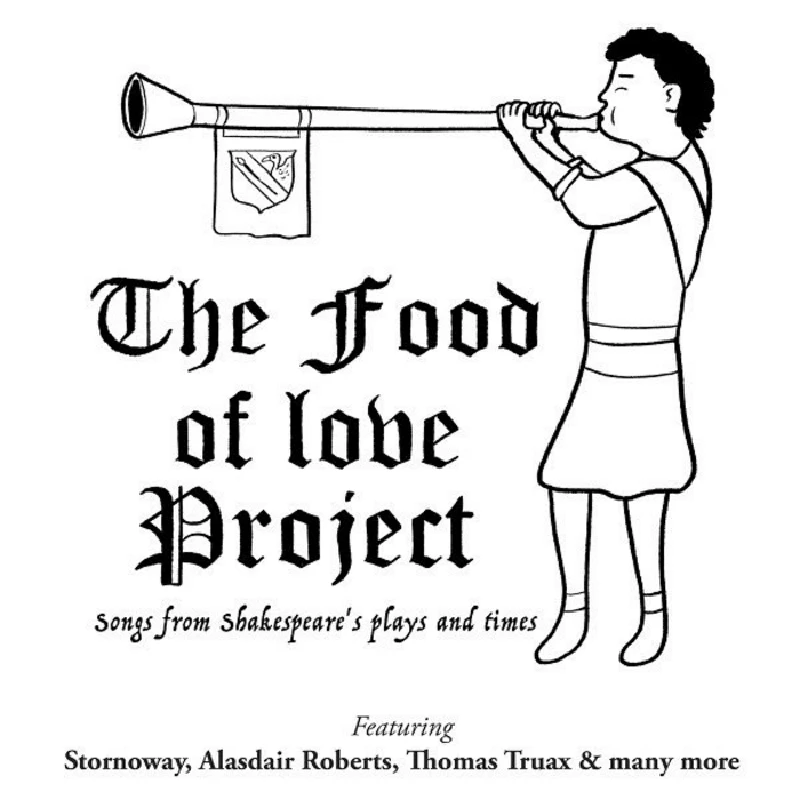Food of Love Project - Interview
by Nicky Crewe
published: 8 / 2 / 2017

intro
Nicky Crewe talks to co-curator Tom McConnell about 'The Food of Love Project', a compilation album which compiles together new recordings of Shakespearean and other Elizabethan age songs from a collection of contemporary folk and experimental artists
Earlier this year Sebastian Reynolds of Pindrop Publicity and Tom McDonnell of TMD Media curated 'The Food of Love Project', a compilation album of songs with their roots in Shakespeare's times and plays. Commissioned for the Oxford Shakespeare Jubilee 2016, it was one of a series of events to mark the 400th anniversary of his death. The project attracted some very contemporary musicians from the experimental and folk world including Dead Rat Orchestra and Alasdair Roberts. It also had the blessing and involvement of John Renbourn before his death. Can Shakespeare's world reach out to ours? The enduring popularity of his plays and the recent experimental reinterpretations of 'Hamlet' and 'King Lear' keep his work alive. Something similar is happening in this project, with reinterpretations of songs associated with or mentioned in the plays. I am a fan of Shakespeare (and a one time performer of one of these songs from 'Hamlet'), and was intrigued to review the collection recently. When the chance arose to interview Tom I took it. It's fascinating to find out more about the progress of 'The Food of Love Project', which will be released on the 20th February, and good to hear that there are plans to extend it, both in recordings and performance. PB: How did you get involved in the project and how long did it take to prepare and deliver? TM: Whilst researching for a book I wrote on Shakespeare’s connections to Oxford {'Sweete Wittie Soules'} I was surprised by the great many songs that were eluded to or mentioned in Shakespeare’s plays. I was in the process of organising the Oxford Shakespeare Jubilee with Seb Reynolds to commemorate the 400th anniversary since Shakespeare’s death when it occurred to me what a great idea it would be to create an album of music referenced or performed in Shakespeare’s works. I would say that the project was around fourteen months in the making. PB: Were you able to access funding to help? TM: We did not apply for funding though both of us were already seeking funding for other projects at the time. PB: How did you get people on board? Did you approach them or did they approach you? TM: We approached all of the artists. Between Seb and myself we knew all them either through our work within the industry or personally. The only artist involved who we did not really know was Kirsty Law who had approached me for a concert whilst the project was well underway. We were very lucky to have her on board. PB: Sadly John Renbourn died before the project was completed, but did his interest help and encourage others? TM: Most of the artists knew that John Renbourn was involved so that may have had some sway though I believe all of the artists would have probably contributed anyhow, I deduce this from the great enthusiasm that this project was greeted with. PB: The songs are from Shakespeare's plays and times. How did you and the other artists involved go about researching them and what sources did you use? TM: The research required for this project was fascinating and highly enjoyable. I listened to a great number of albums to garner inspiration for which songs to offer the artists, careful to ensure that they were compositions from Shakespeare’s life and times. Tom Kines' 1961 album, 'Songs from Shakespeare’s Plays and Times', was in particular a real pleasure to listen to. There were a few hitches along the way. Both myself and James Bell chose to go with 'Mad Tom of Bedlam' for him to work with assuming that the version which has been covered by hundreds of artists was the traditional one. We later discovered that though the lyrics are centuries old the music was composed by Nick Jones and Dave Moran in the 1970s. Their version has been the assumed standard and covered by artists who have rarely asked Jones and Moran for their permission - of which they kindly gave us. Dead Rat Orchestra diligently researched their commissions, looking through the invaluable 1621 tome, 'Burton's Anatomy of Melancholy'. Besides attending concerts and watching plays, I busied myself with a number of books on songs from the Bard's plays, perhaps the most comprehensive being 'Shakespeare’s Songbook' by Ross W. Duffin. It is very interesting that modern theatre audiences would simply not realise that some of Shakespeare’s lines were referencing the most popular songs of his time, and that his references to the songs would have had a very different impact on his audience. For example when Falstaff in 'The Merry Wives of Windsor' says, “I see what Thou wert, if Fortune thy foe were not, Nature thy friend,” he is actually alluding to one of the most popular songs of the 17th century, 'Fortune My Foe,” a song commonly sung by crowds at the Tyburn hangings PB: There's a fascinating mix of artists and collaborations in the project. Do you see yourselves as 'curators', following your own interests and connections, or does it reflect the artists' choices? TM: We gave each of the artists a choice of a handful of songs with which they had complete freedom to interpret as they wished so we are curators on a project in which the artists’ choices and especially their individual styles are also prominent. PB: Do you know if any of the artists have included the songs in their individual repertoires? TM: I know that James Bell and Brickwork Lizards have included their versions within their repertoire. There were concerts featuring different combinations of the artists involved earlier in 2016. PB: Are there any plans to perform some or all of the Food of Love Project again? TM: I am aiming to organise some Food of Love project concerts for April 2018. PB; What would you like the legacy of the project to be? Did it give you a sense of connection with Shakespeare's world and music time? TM: I would like the project's legacy to be an ongoing endeavour. I am already working on Volume 2. I think the project does bring forth a connection with Shakespeare’s world and music. It has been fascinating to see how some of the ancient songs fit so well with quite modern interpretations. 'I Loathe That I Did Love' by Flights of Helios is a great example of that. PB: Thank you. The main photograph was taken by Pier Corona and shows Tom McDonnell performing with Brickwork Lizards at the London date of the Food of Love Project tour in April 2016.
Play in YouTube:-
Picture Gallery:-

most viewed articles
current edition
Carl Ewens - David Bowie 1964 to 1982 On Track: Every Album, Every SongArmory Show - Interview with Richard Jobson
Colin Blunstone - Thalia Hall, Chicago, 16/7/2025
Visor Fest - Valencia, Spain, 26/9/2025...27/9/2025
Bathers - Photoscapes 1
John McKay - Interview
Loft - Interview
Billie Eilish - O2 Arena, London, 10/7/2025
Robert Forster - Interview
Sir Tim Rice - Interview
previous editions
Heavenly - P.U.N.K. Girl EPManic Street Preachers - (Gig of a Lifetime) Millennium Stadium, Cardiff, December 1999
Beautiful South - Ten Songs That Made Me Love...
Oasis - Oasis, Earl's Court, London, 1995
Pixies - Ten Songs That Made Me Love...
Boomtown Rats - Ten Songs That Made Me Love....
Trudie Myerscough-Harris - Interview
Prolapse - Interview
Peter Perrett - In Dreams Begin Responsibilities Interview Part One
Simon Heavisides - Destiny Stopped Screaming: The Life and Times of Adrian Borland
most viewed reviews
current edition
Amy Macdonald - Is This What You've Been Waiting For?Sick Man of Europe - The Sick Man of Europe
Lucy Spraggan - Other Sides of the Moon
Phew, Erika Kobayashi,, Dieter Moebius - Radium Girls
Davey Woodward - Mumbo in the Jumbo
Alice Cooper - The Revenge of Alice Cooper
Bush - I Beat Loneliness
Suzanne Vega - Flying With Angels
Blueboy - 2
Cynthia Erivo - I Forgive You
Pennyblackmusic Regular Contributors
Adrian Janes
Amanda J. Window
Andrew Twambley
Anthony Dhanendran
Benjamin Howarth
Cila Warncke
Daniel Cressey
Darren Aston
Dastardly
Dave Goodwin
Denzil Watson
Dominic B. Simpson
Eoghan Lyng
Fiona Hutchings
Harry Sherriff
Helen Tipping
Jamie Rowland
John Clarkson
Julie Cruickshank
Kimberly Bright
Lisa Torem
Maarten Schiethart